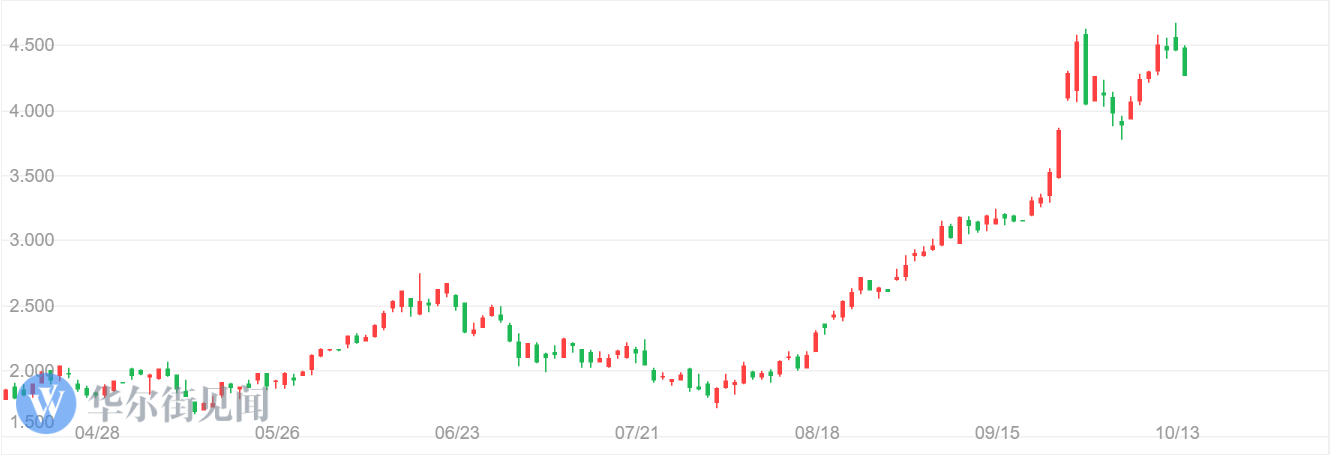Either sterling or UK bond will collapse.
The "tax cut panic" spread in UK, and the yield of UK bonds, after the central bank announced on September 28th that there was no upper limit on the purchase of government bonds, once again reached the high point since the financial crisis in 2008.
Why did the Bank of England buy government bonds? Previous Review of Popular Edition:
Britain's new Prime Minister Truss succeeded Huang Mao-planning to do something big to get everyone to recognize her (and divert her attention from sending the Queen away)-first taking the inflation that is about to get out of control-planning to increase everyone's income to fight inflation (by the way, pull some votes to boost their support rate)-cutting taxes! -The government's revenue from tax revenue is reduced, so it must expand debt (national debt) to balance expenditure-investors demand higher yields on sterling national debt, and the yield on British debt has soared-leveraged pensions with national debt as the underlying trading asset have liquidity problems-the Bank of England announced a large purchase of national debt indefinitely.
(References: Why the UK Makes a Terrible Start?)
The Bank of England's purchase of government bonds is essentially a loose monetary policy.It runs counter to the tightening policy in the current environment of raising interest rates. In other words, Britain's macroeconomic policy is quite contradictory at present.
What the market hates, besides the bad news itself, isUncertainty of the message itself.
For example, Truss doesn't know how to govern the country, and the slogan of tax reduction is loud, but whether it can be implemented or even whether his own policies are consistent is very uncertain. For a time, the market didn't know "whether to bet on tax reduction or not".
For another example, the Bank of England raises interest rates while releasing water, which makes it difficult for the market to interpret its monetary policy signals. Monetary policy itself is also greatly reduced.
What's more, the fluctuation of the pricing of national debt breaks the balance of pension with national debt as the main underlying asset.Market confidence and liquidity have undergone extreme changes, so it is not so easy to establish a new balance.
Britain's tax reduction plan is unrealistic
First, this is an irresponsible political game.
Truss, because of the new official's three fires in office and the current crisis, wants to give it a shot, trying to learn from Margaret Thatcher's "working miracles vigorously" and force tax cuts in an inflationary environment. Her original intention is just a gamble in her political career-if she wins, she is the second "Iron Lady" to save Britain; If you lose the bet, just replace it with the next "Boris Johnson" and have no worries.
In several recent TV interviews, Truss showed that he knew nothing about economics.
She is not the second Iron Lady, she is just a political passer-by.
Second, tax reduction is not the best way to reform the supply side.
The success of China's supply-side reform is mainly due to the successful removal of excess capacity and its transformation into other productive forces. However, the situation in Britain is completely opposite, and it is short of supply.
From the perspective of enterprises, the biggest factor affecting enterprises' supply to the market is not tax, but rising costs. The reason why the British government thought of starting from the supply side may be to look at the "Reagan Economics" in the United States in the 1980 s. They have certain things in common:
- Stimulate supply growth by reducing taxes and relaxing economic intervention, and implement large-scale deficits.
- Take the background of high interest rate as the support point of loose fiscal policy and tight monetary policy.
But everything can't be copied. There are obvious differences between the United States in Reagan era and Britain now:
First, Reagan economics mainlyIt is a "correction" of Keynes's demand theory (big government intervention) in the 1970s;
Second,Today's energy crisis and the problem of labor supplyUnlike at that time, tax reduction, etcFiscal policy cannot solve these problems;
Third, and most crucially,The US dollar's international currency status far exceeds that of the British pound, which can support the US fiscal policy, can attract overseas capital to return through high interest rates, but the pound does not have this condition, and at present, the whole world is in the cycle of raising interest rates, so it is difficult for the pound to slow down its depreciation.
Third, if fiscal policy becomes dominant,Britain will have "no policy" in the face of inflation.
If the British government still wants to ease the public's doubts by expanding fiscal policies such as tax reduction, monetary policy will lose its original effect under the great conflict between fiscal policy and monetary policy.
The Bank of England raised interest rates, on the one hand, to keep up with the pace of overseas interest rate hikes, on the other hand, to control inflation. At this time, the expansion of fiscal policy can not only offset the effect of raising interest rates, but also cause the financial crisis under the high interest rate environment.
British debt is on the edge of a cliff at present, and sterling is afraid to become the biggest loser?
The Bank of England also had some inconsistent voices before. After the news of "extending bond purchase" broke out yesterday afternoon, the Bank of England stood up and rumored that the plan was still scheduled to end this Friday (October 14th).
The market is not stable at all, and liquidity is difficult to recover for a while. If the central bank suddenly stops buying bonds, British bonds may collapse.So there may be a black swan incident in British pensions. Historically, the Bank of England has suddenly changed its decision.
Therefore, the market actually expects the Bank of England to continue to buy bonds, and the statement of the Bank of England seems to be a warning to Prime Minister Truss-please choose between "your plan" and "market crash".
At present, the British government has advanced the medium-term financial plan originally announced in November to October 31st, trying to stabilize market confidence as soon as possible. But at present, as long as the stimulus scale of the British government is still considerable,Apart from national debt financing, there are no other reasonable financing methods.
However, stabilizing the financial system is one of the central bank's accusationsTherefore, although Bank of England Governor Bailey is very reluctant to take the blame, as long as the government still goes its own way and withdraws from the expansion policy (which may be reduced in scale),The central bank will still provide liquidity for the volatile national debt market. At present, there are no other reasonable ways to provide liquidity.
This also means that the pound will continue to be under pressure in a relaxed environment.
$英镑主连 2212(GBPmain)$$Invesco CurrencyShares British Pound Sterling Trust(FXB)$$英国10年期国债收益率(GB10Y.BOND)$$VANGUARD FTSE 100 UCITS ETF(VUKE.UK)$


Comments
The British Pound is facing one of the strongest headwinds with high inflation and political instability.
The Bank of England is in a tough position and has to do whatever is necessary to support the British pound. Unfortunately Liz Truss, the Prime Minister is thinking that tax cuts will solve the problem.
Against the strong US dollar, the British pound is weak. It will take time for things to settle down.
Thanks @MaverickTiger for your excellent article on the British Pound and the challenges it is currently facing.